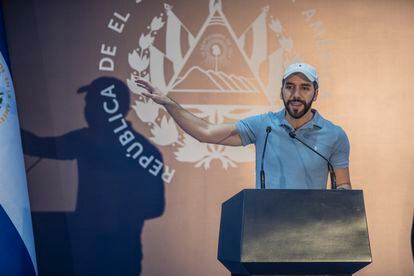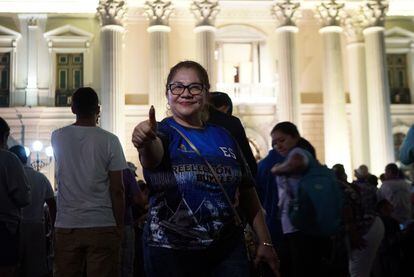Roberto González constantly updates the president's X (formerly Twitter) account. He wants to know if Nayib Bukele, who declared himself the winner with 85% of the votes before the official results, has written anything else. At the moment, the fact that he has stated that he has “the record in the entire democratic history of the world” in an election makes him jump for joy. “If he gets all the deputies he will make even more history,” says this motorist from Sonsonante, who has come to the presidential palace of San Salvador to celebrate a victory that everyone already knew about. The country had a winner months ago, it just needed to be confirmed.
The voting center on Olympic Avenue in the capital looks like a campaign event. Bukele's party, Nuevas Ideas, has set up a dozen tents, organized a batukada, released blue rockets and played drums in the space where the president and thousands of other citizens are going to vote. At the entrance and exit of the polling stations there are only banners, t-shirts, caps and individuals identified by the ruling party. The sensation overwhelms even an unarmed opposition, whose vote watchers do not even dare to identify themselves in the face of the cyan tide.
María de Luz sells cookies sitting on a sidewalk while observing the noise from afar. She was offered to participate, but she says that she is not made to scream. This cashier who learned to bake in a supermarket to get out of poverty still speaks softly when she talks about the gangs, the “manchados.” They killed her nephews 12 years ago, the girl, 16, was found dismembered in a river, the boy was found hanged, “all swollen.” He takes a handkerchief out of her powdered backpack to dry herself and says: “We are the ones who have endured all the sadness, all the misery, those outside don't understand it.”
Bukele took power from the gangs and the streets and the figures say that. With that achievement in hand, the president has violated the Constitution, which prevents him from being re-elected, and has molded a State in his own style, in which he has come to control all the institutions while the people applaud.
Sounds It's the end of the world as we know it (and I feel fine), of REM, when he arrives to vote accompanied by his wife, Gabriela Rodríguez, and his brothers Karim and Yusef, who are part of his exclusive core of trust. The Salvadorans shout as they watch his idol get out of a giant truck, wearing a white cap and a light blue Ralph Lauren polo shirt, and looks at them smiling.

In the next event, Bukele is in a press room at the Sheraton hotel in the capital. He has summoned the international media to answer some questions. And he answers them. In front of the BBC about what happens to the thousands of innocent people in prisons, the president says in English that all police forces can make mistakes, that there are surely also innocent people imprisoned in the United Kingdom, who are, in short: “A couple of mistakes” (a couple of errors). “Stop telling us how to do things because your system doesn't work here. We tried the recipe of the UN, the United States and the European Union for years, and it did not work. Do we have to be the democracy that you tell us? Do we have to let the gangs kill the children?,” she says, and moves on to the next one. When she finishes with the press, she continues tweeting to call for the vote.
This Sunday, Bukele has written 23 tweets and the majority have been with images of Salvadorans voting in the United States: lines in Virginia, Maryland, California, New Jersey, Texas and New York. After the polls closed, he fought with the Electoral Tribunal—which he controls—for preventing those who were still waiting in some of those centers from voting. That has not happened to Nelly Ángel, who poses with her stained finger in front of the presidential palace in the capital. The woman, 60, arrived the day before with her brother and her husband from Maryland, where they have lived since fleeing the Civil War. It is Bukele's fault that they are now going to bring his electricity company to San Salvador after 34 years.

In the square that awaits the president there are, above all, stories of return. Oscar Jordan has been washing ships for the US Navy for 40 years. He has returned to see what has changed in the country he fled because of poverty. Francisco Ponce dreamed of returning each of the 49 years he was away. He worked as a chef in Palmdale, on the outskirts of Los Angeles, because h
e did not want to face violence, first from the war and then from the gangs. Last year he moved back to the capital, where he started managing an apartment. “My American dream was left behind, now I am participating in being here.” Amadeo Flores' sister has taken a five and a half hour flight just to vote in San Salvador. She returns tomorrow to New York, where she lives. The two have Bukele's face printed on a T-shirt and run away when the screens project the president's tweet in which he declares himself the winner of the elections.
After ten at night, Bukele appears to give his message at the presidential palace when the minutes were, according to the Electoral Court, still 13.8% scrutinized. He goes out to the balcony. He rings again It's the end of the world as we know it. He talks about making history: “It will be the first time that there is a single party in a fully democratic system, the opposition has been pulverized.” A little while before, to a question from EL PAÍS, about what his vice president, Félix Ulloa, meant by saying that they were going to eliminate democracy to replace it with something new, Bukele explained that he cannot eliminate democracy because before him there was no democracy, it was he who had brought it. There is no doubt in the one who wins: he is always the Savior.
Follow all the information from El PAÍS América in Facebook and xor in our weekly newsletter.
#day #Bukele #Salvador